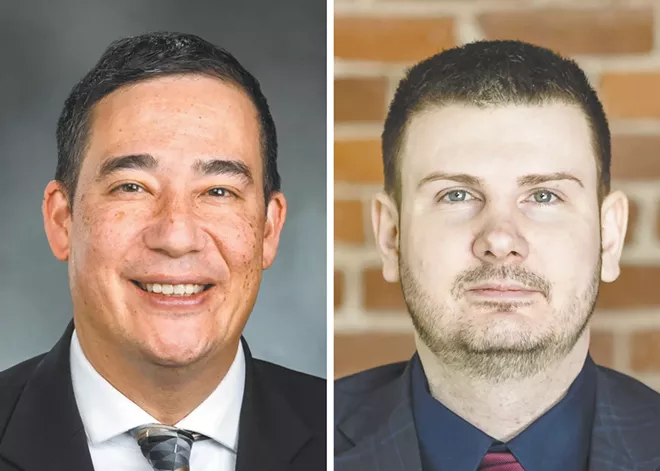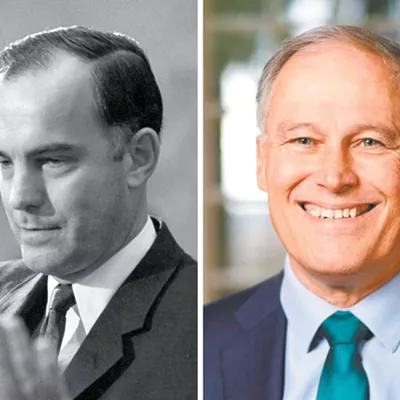The best thing about playing games like Dungeons & Dragons or Magic: The Gathering is that you can make things happen fast. You have spells or staffs that wield huge amounts of power in your imagined world. It's intoxicating.
Democracy doesn't usually feel like that. When you cast your vote, it slowly gets tallied along with all the other ballots in the box.
But all those votes add up to something big, and the process has to be protected for democracy to survive.
That's where the secretary of state steps in. They're the primary guardian of safe elections in Washington, and also oversee state archives, public libraries and business licenses.
Election security has been repeatedly questioned since former President Donald Trump's denial of the 2020 election results, and secretaries of state have received far more public scrutiny.
In this year's race for Washington secretary of state, incumbent Steve Hobbs and challenger Dale Whitaker from Spokane will appear on the Nov. 5 ballot.
HOBBS
Hobbs is an Army veteran, a former state senator for Washington's 44th legislative district from 2007 to 2021, a Democrat, and the 54-year-old son of a Japanese immigrant. Gov. Jay Inslee appointed Hobbs to replace Kim Wyman as secretary of state in 2021, and Hobbs won a special election in 2022 to serve the rest of the term.Hobbs is also an avid gamer. When he plays Dungeons & Dragons, he's a level 20 evocation wizard called BeeCo Wild Magic Wishring.
He's interested in the gamification of education and civic engagement. He's working with Washington-based game developers to create tabletop and digital games that get young people interested in wielding power in both imaginary and real world settings.
To Hobbs, the biggest threats to election security are disinformation campaigns, and cyberattacks from Russia and other nation-state actors who often weaponize generative artificial intelligence on social media.
"It doesn't matter to them who really wins," Hobbs says. "They would like to have a winner, but for them, it is better to cause a disruption. For example, before people were fighting one another after 2020, we had a unified effort against countries like Russia and China and North Korea. We don't have that now."
As secretary of state, Hobbs created a new team of cybersecurity experts to work with local auditors who oversee elections at the county level. He's also worked to make his office more transparent about the systems in place to protect against potential domestic election fraud, which he says is as low as a fraction of a percentage point.
For example, the Electronic Registration Information Center, or ERIC, cross-references databases, including Social Security, to make sure no one votes twice, or that anyone who has died, even between filling out a mail-in ballot and Election Day, is not included in the final count.
Contrary to some alarmist social media posts, Washington's tabulation machines are not connected to the internet and can't be hacked by foreign agents, Hobbs says.
Still, between 20% and 30% of Americans have lost trust in elections, Hobbs says, and it's his office's role to win them back.
"I believe doing that involves just telling the truth about elections," Hobbs says. "If you don't believe me because I'm a Democrat, that's fine — go to your county auditor to actually see the process yourself, because you can actually watch all this."
WHITAKER
Whitaker is a British immigrant, a tax accountant, a Republican, and was previously the executive director for We Believe We Vote, a Christian organization that recommends candidates to voters. Whitaker says he has proven his dedication to ethics and transparency, noting that he filed federal whistleblower complaints against Augusta Precious Metals, his previous employer, accusing them of using right-wing media to push bad investments on customers who then lost savings.
To Whitaker, 35, the greatest threat to American elections is internal, not external.
"The biggest threat to Washington state election security is voter apathy — people feeling like their vote doesn't count," Whitaker says. "The only way that you overcome that is through transparency."
In a recent debate hosted by the League of Women Voters, Hobbs accused Whitaker of denying the 2020 presidential election results.
"I have never denied the election," Whitaker says. "I do not believe that. Secretary Hobbs has told multiple journalists that I am an election denier, and that is simply not true."
Whitaker accuses Hobbs of acting unconstitutionally by agreeing to eliminate the Washington State Constitution's requirement that voters must prove they've lived in the state for 30 days before an election. Last November, the Washington State Alliance for Retired Americans sued the state over the 30-day requirement, and in March a district court approved a consent decree eliminating it.
Hobbs says the requirement disenfranchised people, like military families who move often, and violated the Federal Voting Rights Act. Whitaker disagrees.
"The people should get to vote on a constitutional amendment, and it should go through the proper channels in order to make those changes," Whitaker says. "The Federal Voting Rights Act does not trump the Washington State Constitution."
Whitaker wants to eliminate the 2025 annual business license renewal fees to put money back into the pockets of small business owners. He wants to cut back on staff at the Olympia office and if elected, get out into communities more to dispel distrust.
"The first thing is that we have to let voters know that their vote counts," he says. "Secondly, we need to encourage them to bring their friends to the polls. ... My job would be to focus on getting into communities and talking to folks and dispelling narratives about our electoral system so that they can understand that, hey, your candidate might not win, but you can trust the system." ♦


























